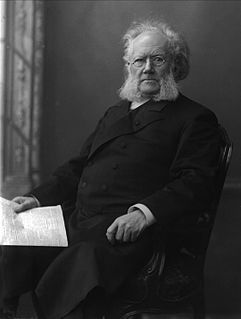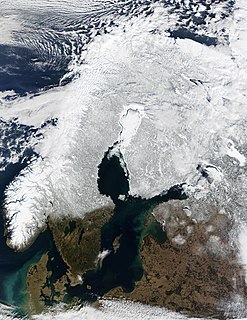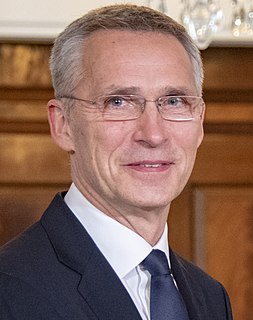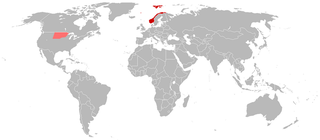
Henrik Johan Ibsen was a Norwegian playwright, theatre director, and poet. As one of the founders of modernism in theatre, Ibsen is often referred to as "the father of realism" and one of the most influential playwrights of his time. His major works include Brand, Peer Gynt, An Enemy of the People, Emperor and Galilean, A Doll's House, Hedda Gabler, Ghosts, The Wild Duck, When We Dead Awaken, Pillars of Society, The Lady from the Sea, Rosmersholm, The Master Builder, and John Gabriel Borkman. He is the most frequently performed dramatist in the world after Shakespeare, and by the early 20th century A Doll's House became the world's most performed play.

Norway, officially the Kingdom of Norway, is a Nordic country in Northern Europe whose territory comprises the western and northernmost portion of the Scandinavian Peninsula; the remote island of Jan Mayen and the archipelago of Svalbard are also part of the Kingdom of Norway. The Antarctic Peter I Island and the sub-Antarctic Bouvet Island are dependent territories and thus not considered part of the kingdom. Norway also lays claim to a section of Antarctica known as Queen Maud Land.

Oslo is the capital and most populous city of Norway. It constitutes both a county and a municipality. Founded in the year 1040 as Ánslo, and established as a kaupstad or trading place in 1048 by Harald Hardrada, the city was elevated to a bishopric in 1070 and a capital under Haakon V of Norway around 1300. Personal unions with Denmark from 1397 to 1523 and again from 1536 to 1814 reduced its influence, and with Sweden from 1814 to 1905 it functioned as a co-official capital. After being destroyed by a fire in 1624, during the reign of King Christian IV, a new city was built closer to Akershus Fortress and named Christiania in the king's honour. It was established as a municipality (formannskapsdistrikt) on 1 January 1838. The city's name was spelled Kristiania between 1877 and 1897 by state and municipal authorities. In 1925 the city was renamed Oslo.

Scandinavia is a region in Northern Europe, with strong historical, cultural, and linguistic ties. The term Scandinavia in local usage covers the three kingdoms of Denmark, Norway, and Sweden. The majority national languages of these three, belong to the Scandinavian dialect continuum, and are mutually intelligible North Germanic languages. In English usage, Scandinavia also sometimes refers to the Scandinavian Peninsula, or to the broader region including Finland and Iceland, which is always known locally as the Nordic countries.

Vidkun Abraham Lauritz Jonssøn Quisling was a Norwegian military officer and politician who nominally headed the government of Norway during the occupation of the country by Nazi Germany during World War II. He first came to international prominence as a close collaborator of explorer Fridtjof Nansen, organizing humanitarian relief during the Russian famine of 1921 in Povolzhye. He was posted as a Norwegian diplomat to the Soviet Union, and for some time also managed British diplomatic affairs there. He returned to Norway in 1929, and served as Minister of Defence in the governments of Peder Kolstad (1931–32) and Jens Hundseid (1932–33), representing the Farmers' Party.

Haakon VII, known as Prince Carl of Denmark until 1905, was a Danish prince who became the first king of Norway after the 1905 dissolution of the union with Sweden. He reigned from November 1905 until his death in September 1957.

Olav V was King of Norway from 1957 until his death.

Harald V is the King of Norway, having ascended to the throne upon the death of his father King Olav V on 17 January 1991.

Jens Stoltenberg is a Norwegian politician who has been serving as the 13th Secretary General of NATO since 2014. A member of the Labour Party, he was Prime Minister of Norway from 2000 to 2001 and from 2005 to 2013.

Ole Gunnar Solskjær is a Norwegian football manager and former player who is the manager of English club Manchester United. As a player, he spent most of his career playing as a forward for Manchester United.

The Norway men's national football team represents Norway in international association football and is controlled by the Football Association of Norway, the governing body for football in Norway. Norway's home ground is Ullevaal Stadion in Oslo and their head coach is Lars Lagerbäck. It is, as of February 2019, ranked by FIFA as the 48th best national football team in the world.

Sweden and Norway or Sweden–Norway, officially the United Kingdoms of Sweden and Norway, or as the United Kingdoms, was a personal union of the separate kingdoms of Sweden and Norway under a common monarch and common foreign policy that lasted from 1814 until its amicable and peaceful dissolution in 1905.

Louis Cachet, more popularly known as Varg Vikernes, is a Norwegian musician, writer, and blogger. In 1991, he founded the one-man music project Burzum, which became one of the most influential black metal acts. In 1993, while Vikernes was a member of black metal band Mayhem, Vikernes murdered his bandmate. He was convicted of murder and arson, and subsequently served 15 years in prison.

Brigadier Sir Nils Olav is a king penguin who resides in Edinburgh Zoo, Scotland. He is the mascot and colonel-in-chief of the Norwegian King's Guard. The name 'Nils Olav' and associated ranks have been passed down through three king penguins since 1972 – the current holder being Nils Olav III.

The Norwegian monarch is the monarchical head of state of Norway, which is a constitutional and hereditary monarchy with a parliamentary system. The Norwegian monarchy can trace its line back to the reign of Harald Fairhair and the previous petty kingdoms which were united to form Norway; it has been in unions with both Sweden and Denmark for long periods.
Knut Helle was a Norwegian historian. A professor at the University of Bergen from 1973 to 2000, he specialized in the late medieval history of Norway. He has contributed to several large works.

The Nobel Peace Prize is one of the five Nobel Prizes established by the will of Swedish industrialist, inventor, and armaments manufacturer Alfred Nobel, along with the prizes in Chemistry, Physics, Physiology or Medicine, and Literature. Since March 1901, it has been awarded annually to those who have "done the most or the best work for fraternity between nations, for the abolition or reduction of standing armies and for the holding and promotion of peace congresses".

The 2011 Norway attacks, referred to in Norway as 22 July or as 22/7, were two sequential lone wolf domestic terrorist attacks by Anders Behring Breivik against the government, the civilian population, and a Workers' Youth League (AUF) summer camp, in which 77 people were killed.

Anders Behring Breivik, since 2017 legally Fjotolf Hansen and also known by his pseudonym Andrew Berwick, is a Norwegian far-right terrorist who committed the 2011 Norway attacks. On 22 July 2011, he killed eight people by detonating a van bomb amid Regjeringskvartalet in Oslo, then shot dead 69 participants of a Workers' Youth League (AUF) summer camp on the island of Utøya. In July 2012, he was convicted of mass murder, causing a fatal explosion, and terrorism.


















